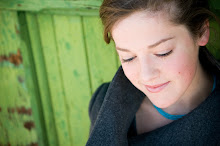When Mr. Tansley and Mrs. Ramsay come out on the quay, and he is overcome by her beauty, we are introduced to a very unique experience he has. "Under the influence of that extraordinary emotion which had been growing all the walk, had begun in the garden when he had wanted to take her bag, had increased in the town when he had wanted to tell her everything about himself, he was coming to see himself, and everything he had ever known gone crooked a little. It was awfully strange" (13). This experience reminded me of what Kari spoke of in class on Wednesday, seeing everything she looked at as crooked for about an hour and a half. If I remember correctly this epiphany was the result of spending four hours looking at Salvador Dali (and possibly others.) When she mentioned Dali (if it was her,) I thought of this painting:

For me, this painting embodies Mrs. Ramsay (though possibly younger and without James.) It is very different from Lily's painting, and yet, it too lacks the lighthouse (which Lily does eventually add with a flourish.)
Back to Mr. Tansley's epiphany. . . After the previous moment of seeing things crookedly and not quite understanding why, he finally realizes, when he sees her standing "quite motionless for a moment against a picture of Queen Victoria wearing the blue ribbon of the Garter" that "it was this: it was this:—she was the most beautiful person he had ever seen.

Mrs. Ramsay: We hear the waves "like a ghostly roll of drums remorselessly beat the measure of life." They "warned her whose day had slipped past in one quick doing ofter another that it was all ephemeral as a rainbow—this sound which had been obscured and concealed under the other sounds suddenly thundered hollow in her ears and made her look up with an impulse of terror" (16). Because the sound of the waves are this terrifying to Mrs. Ramsay, their presence takes the utmost sense of awful in this moment. In all other moments I would imagine the sea as beautiful (even if it was turbulent) simply because it is the sea, and because seas are full of wonder. But in this moment, the moment one realizes that the waves never stop pounding against the shore, never stop beating out the remorseless measure of life, the sea is the most terrible entity one can imagine.
I also saw a mini epiphany (which I can't quite explain the nature of why exactly it is epiphanic) when Lily and William are standing in front of her painting. "But something moved, flashed, turned a silver wing in the air" (19). A bird. Why does Woolf put this in? And then off they stroll . . .



No comments:
Post a Comment